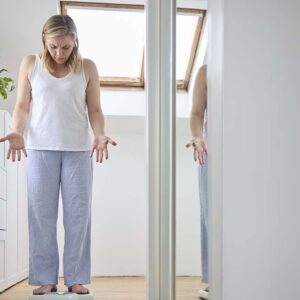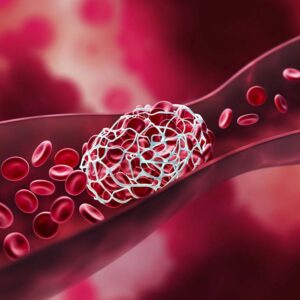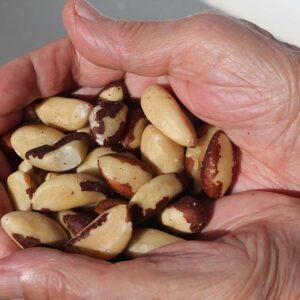
Study Reveals Major Health Threat in Your Home
- New health threat takes a back seat only to high blood pressure, poor diet, and smoking.
- Are you breathing in these cancer causers and heart attack triggers? Find out more…
- Discover one simple way to find out exactly which toxins are in your home.
Dear Living Well Daily Reader,
“Go get some fresh air…”
That’s a suggestion you may not hear much longer.
In fact, according to new research, it’s a suggestion you should probably ignore now… if you care about your health.
Not because taking a “breather” is a bad health practice.
No, taking a deep breath can have all sort of health benefits… except when it’s done in a toxic environment.
And according to a disturbing report released by the International Energy Agency (IEA) on Monday, chances are every breath you take has something bad in it.
The report shows that air pollution has become a public health catastrophe liable for the premature deaths of 6.5 million people every year.1
This means air pollution is now the fourth-largest human health threat, just after high blood pressure, poor diet, and smoking.1
But the bad news gets worse.
Without action, death by air pollution will continue to rise. By the year 2040, the estimated death toll will reach 7.5 million.
So why exactly is air pollution deadly?
![]() More Particles, More Problems
More Particles, More Problems
Many factors add to air pollution levels including, industrial manufacturing, fossil fuel-based transportation and shipping sources, and even natural occurrences like volcanic activity.
However, according to the IEA’s report, the release of harmful pollutants is mostly due to unregulated production and use of energy, which creates particulate matter (PM).
PM contains acid, dust, metal, soil particles, and mold spores, which not only create air pollution, but are also responsible for reduced visibility or haze (think smog).
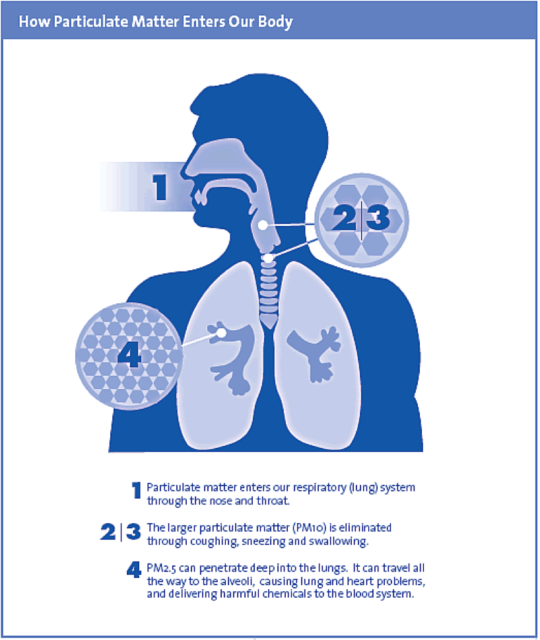
Source: bcairquality.ca
Miniscule PM is particularly problematic for your heath, because these tiny particles can get deep into your lungs, and some can even enter your bloodstream.
But more importantly, PM can cause deadly health issues like heart disease, strokes, and lung cancer with long-term exposure.
Not to mention PM can also trigger devastating symptoms like heart attack, aggravated asthma, irregular heartbeat, and decreased lung function through inflammation. 3
In addition to particulate matter, volatile organic compounds ( VOCs) contribute to the health issues associated with air pollution. VOCs are released from fuels, chemicals, and solvents and evaporate into surrounding air.
VOC levels are consistently higher in indoor environments. In fact, they can be up to 10 times higher than outdoors. One reason for this is the use of chemicals, paints, adhesives, cleaners and other household products.
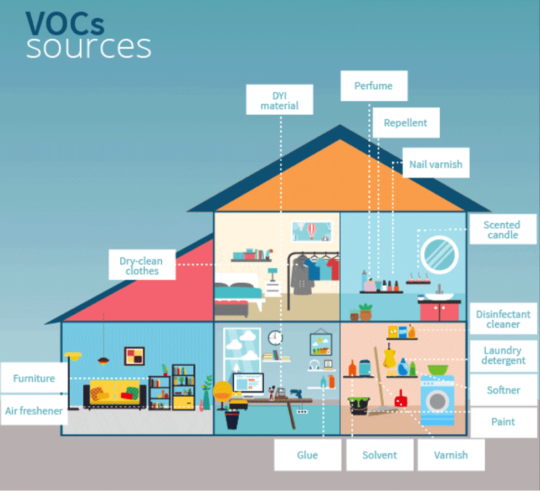
Source: foobot.io
VOCs including benzene and formaldehyde are linked to a range of detrimental health effects like eye, nose, and throat irritation; headaches; loss of concentration; and nausea. More serious heath endpoints include liver damage, kidney damage, central nervous system damage, and cancer.4
However, since most folks spend a majority of time indoors these days, exposure to VOCs and mold spores is likely more prevalent.
![]() Breathe Easy
Breathe Easy
Unfortunately, the only universal resolve for decreasing air pollution is to decrease energy production or at the very least, make it more efficient. And since these actions are in the hands of policymakers and energy producers, any possible improvements will be a long time coming.
But there is something you can control – your home indoor air quality.
The first step to take is to figure out exactly what level of air pollution is inside your home.
You can do this with a home air test.
The most comprehensive home air tests use a sampling pump to collect air from your home and then a lab for analysis. I recommend using Home Air Check.
They will mail you a pump and test kit. Once you mail it back in, they will analyze your sample and send you the results and a detailed report of likely sources of VOCs in your home.
This easy-to-read report will also include targeted advice for improving your indoor air quality.
In addition, Home Air Check uses a lab accredited by the American Industrial Hygiene Association. This accreditation takes months to complete and ensures the lab is fully competent in conducting air quality testing.
Click here to discover more about Home Air Check.
We are using Home Air Check to find out what’s in the air here at the Living Well HQ. We will share the results with you as soon as we get them in. Stay tuned for that!
Live well,

Natalie Moore
Managing editor, Living Well Daily
P.S. Do you currently use an air filtration system? If so, what kind? Let me know!
nmoore@lfb.org
Sources
[1] Energy and Air Pollution 2016 – World Energy Outlook Special Report
[4] Volatile Organic Compounds (VOCs)
Written By Natalie Moore
Natalie Moore is a dedicated health researcher with a passion for finding healthy, natural, and science-based solutions. After a decade of direct healthcare experience in western and natural medicine, she was involved in public health research before joining Living Well Daily.
View More Free Articles
Take the SHORTER Path to Dramatically Better Health
Are you tired of fitness gurus preaching the virtues of 5 AM workouts and pushing Olympic-level training regimens? Their narrative can feel exhausting and entirely unattainable. But before you toss in the towel completely, I’ve got news that might just put a spring back into your step. A groundbreaking new study reveals that the key...
Unexpected Perks of Your Coffee Habit Revealed!
We all know that the first cup of coffee in the morning can FEEL like a lifesaver. But what if it might actually BE saving your life? A groundbreaking new study suggests that your daily coffee habit could be protecting you from not just one but multiple chronic diseases. Let’s pour over this fascinating research…...
The TRUTH About Diabetes Drugs and Brain Aging
You’ve probably seen the gushing headlines… Most say something like, “Common diabetes drug protects the brain against aging!” And let’s face it, that sounds fantastic. After all, who doesn’t want to keep their brain young and in tip-top shape? The headlines refer to the results of a new study that suggests the widely prescribed type...
Hidden Smartphone Danger Puts You at Risk
Remember when we thought cell phones were just something for young folks to obsess over? Back when we were convinced they were nothing more than a passing fad? Well, times certainly have changed. Now, most people… including many of us older folks… have jumped on the smartphone bandwagon. Heck, some of us are practically as...
Preserve Your Mobility with “Agile Aging” Exercises
Aging has a way of humbling us. You lose hair where you want to keep it—and often end up growing it where you don’t. With every passing year, your eyesight fades, and your waistline expands. And as your once quick pace begins to slow, you fear developing the dreaded “senior shuffle.” But here’s the thing....
Yes, Lazy Saturday Lie-Ins Can BOOST Your Health
Are you burning the midnight oil during the week and catching up on sleep on weekends? Well, I’ve got some news that might help you feel less guilty about those lazy Saturday mornings. A new study suggests that weekend lie-ins might be doing far more than just helping you feel refreshed. Experts say they could...
Mailbag: 7 Hidden Culprits Behind Your Weight Gain
“Why am I gaining weight, even though I am watching what I am eating?” – Battling the Bulge Dear Battling, Gaining weight when you’re not trying to is frustrating. And it just gets worse as we age… often regardless of our diet. The truth is that various factors can promote weight gain even when you’re...
Popular Artificial Sweetener Linked to Dangerous Heart Risk
Remember when erythritol was the darling of the health food world? Well, this popular sugar substitute might not be as sweet a deal as we were led to believe… A shocking new study reveals a dark side to this widely used artificial sweetener. It turns out erythritol is associated with a dangerous—and even deadly—heart risk....
Cracking the Code on Chronic Inflammation
Inflammation and obesity are the evil tag team at the heart of nearly every major disease we face—from diabetes to obesity. What starts as a normal, healthy process to fend off dangerous invaders can quickly fan into the flames of chronic inflammation… and that includes in your gut. The trouble is almost no one has...
Dreaming of Better Sleep? Your Gut Holds the Key
Do you toss and turn at night? If so, you’re not alone. In fact, if you’re a senior over 65, you join nearly 17 percent of your peers who ALSO struggle with poor sleep quality. But science has uncovered a natural supplement that not only could help you catch more Z’s but can also give...






